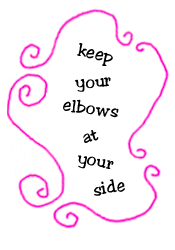 Q Dear Miss Abigail:
Q Dear Miss Abigail:
Please tell me ~ have simple table manners like holding cutlery properly and keeping elbows off the dining table gone out of fashion?
Signed,
Nicole
A Dear Nicole:
I don’t know about you, but table manners in my house have only improved with the advent of the TV. When leaning back on the couch, I never have to worry whether or not my elbows are on the table.
But I suppose a little refresher wouldn’t hurt. This from Decorum: A Practical Treatise on Etiquette and Dress of the Best American Society, published in 1880, still seems relevant for the most part. Now if I could just find my table under the piles of junk, I’d be all set.
1880: General Rules for Behavior at Table
![]() Tea and coffee should never be poured into a saucer.
Tea and coffee should never be poured into a saucer.
If a person wishes to be served with more tea or coffee, he should place his spoon in the saucer. If he has had sufficient, let it remain in the cup.
If anything unpleasant is found in the food, such as a hair in the bread or a fly in the coffee, remove it without remark. Though your own appetite be spoiled, it is well not to spoil that of others.
Never if possible, cough or sneeze at the table. If you feel the paroxysm coming on, leave the room. It may be worth while to know that a sneeze may be stifled by placing the finger firmly upon the upper lip.
Fold your napkin when you are done with it and place it in your ring, when at home. If you are visiting, leave your napkin unfolded beside your plate.
Never hold your knife and fork upright on each side of your plate while you are talking.
Do not cross your knife and fork upon your plate until you have finished.
When you send your plate to be refilled, place your knife and fork upon one side of it or put them upon your piece of bread.
Eat neither too fast nor too slow.
Never lean back in your chair nor sit too near or too far from the table.
Keep your elbows at your side, so that you may not inconvenience your neighbors.
Do not find fault with the food.
The old-fashioned habit of abstaining from taking the last piece upon the plate is no longer observed. It is to be supposed that the vacancy can be supplied if necessary.
If a plate is handed you at table, keep it yourself instead of passing it to a neighbor. If a dish is passed to you, serve yourself first, then pass it.![]()
Source: Ruth, John A. Decorum: A Practical Treatise on Etiquette and Dress of the Best American Society. New York: Union Publishing House, 1880.
~ pp. 213-214 ~